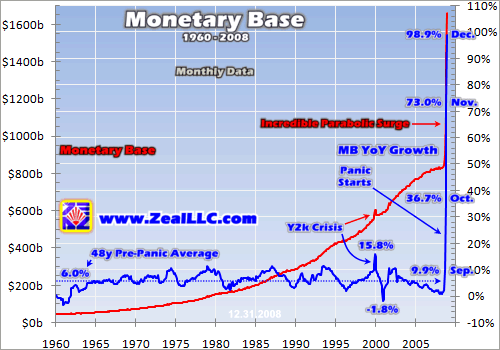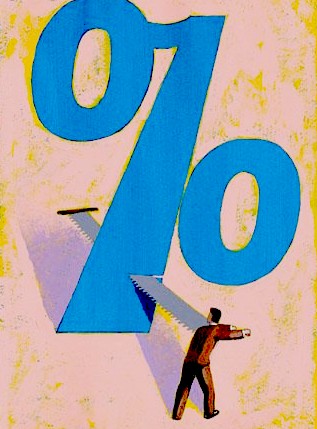
Adam Hamilton proves inflation?
People have been quivering at the feet of fabled Inflation Genie since at least 2007. So far, despite quantitative easing, a weak dollar, and last year’s commodities price spikes, he hasn’t burst out of his Fed-plated lamp.
It may just be a matter of time. The US Federal Reserve is printing money like mad to fund bailouts, zero-interest loans, and mammoth spending plans. All that behind-the-scenes activity looks like it’s edging the country closer to big inflation.
Fortunately, there are tried-and-true ways of hedging against inflation. While none of these methods are risk-free, they are safer than doing nothing:
1. Carry fixed-rate debt.

That applies to mortgages, student loans, and any other debt with variable interest rates. If you pay a fixed interest rate on your debt, you will actually be paying less in real terms as inflation goes up. If your wages go up as well, your debt will become a smaller percentage of your purchasing power. Now is an especially good time to lock in a fixed-rate mortgage.
2. Buy TIPS.

Treasury Inflation-Protected Securities (TIPS) offer a low, steady payout that automatically adjusts for inflation. At time of writing, 20-year TIPS offer a 2.3% yield. Though far from Madoffian, these pint-sized returns are guaranteed not to be eaten up by inflation. I-bonds—Treasury-issued bonds adjusted semi-annually for inflation—are another option. You can buy TIPS and i-bonds individually or through funds such as Vanguard’s VIPSX, an inflation-protected securities fund, or Fidelity’s FINPX.
Read more about TIPS here, and i-bonds here.
3. Avoid bonds.

People anticipate higher interest rates during times of inflation. As a result, bonds lose their value. If you’re holding bonds now, rebalance your portfolio away from them. (I-bonds, mentioned above, are an exception).
Read here for more.
4. Own fixed assets.

Converting your money into fixed assets helps you retain its value. While some fixed assets, like computers, depreciate, others hold their value in the long run. These traditionally include gold/silver coins, real estate, and land.
5. Invest in commodities.

Commodities like gold, oil, and ore rise in price when inflation hits. People need commodities to survive, no matter how expensive they become. Because of that, the companies and funds associated with commodities are inflation-resistant investments.
If gold or silver sounds good, try an ETF (exchange-traded fund) such as iShares Comex Gold (IAU), which tracks bullion prices, or the SPDR Gold Trust (GLD).
ETFs are also relatively low-risk places to invest in commodities. The Deutsche Bank Commodity Index Tracking Fund (DBC), which tracks two different types of oil, corn, wheat, aluminum, and gold, is an example. Note that commodities ETFs still hold most of their assets in money market securities and bonds. Futures contracts are another way to invest in commodities, but last year’s gas price spikes reveals how risky that strategy can be.
If you prefer company stock, look for stable blue chips that produce oil, paper, natural gas, or even water.
Or consider the healthcare industry. Not only is it inflation-resistant, according to author and columnist Harry Domash, but it’s a growth industry, which will boost your portfolio even without inflation. Domash recommends generic drugmakers, manufacturers of diagnostic substances, and specialized health services.
6. Be a miser.

If you haven’t converted to parsimony like the rest of the country, start now. Inflation means that your daily bread basket will cost more than usual. Clip coupons, forego brand-name gas, and buy in bulk to beat inflated prices. If you get into the habit of saving now, you will be more mentally and financially prepared for high inflation.
7. Use the underground economy.

FreeCycle.org, FreeNapkin.com, and Craigslist are examples of places where you can barter or acquire stuff for free. Taking the time to find good, free schwag will save you lots of money in the long run.
8. Keep an eye on interest rates.

Michael Steinberg claims that Helicopter Ben wants us to fear inflation so that he can realize negative interest rates. It seems impossible that the federal funds rate will spike in the near future, but look at what happened between the inflationary period between 1977-80. If interest rates increase–expected during times of inflation–you may be able to profit by locking your money into high-yield CDs. Just be sure to do your homework, in case interest rates are actually lower than inflation.
